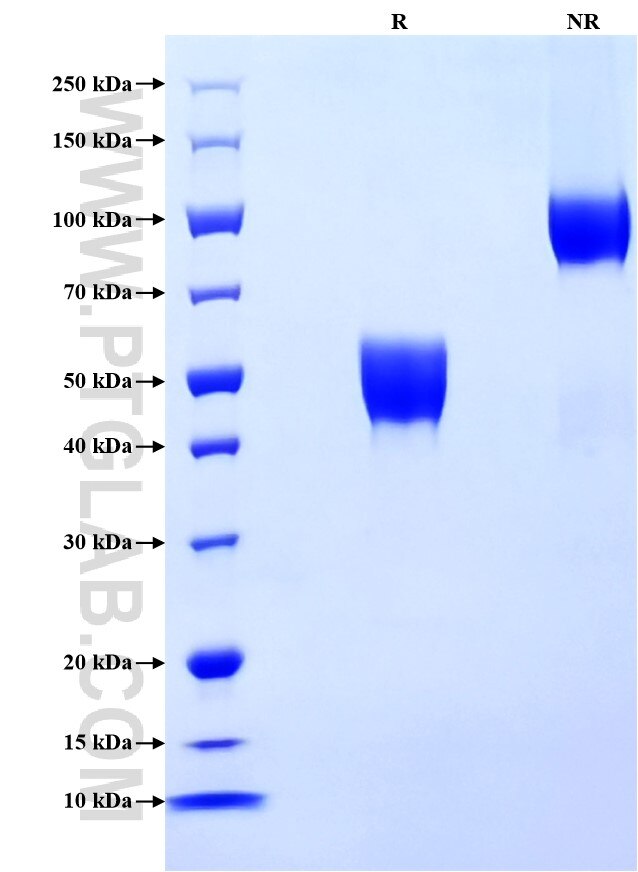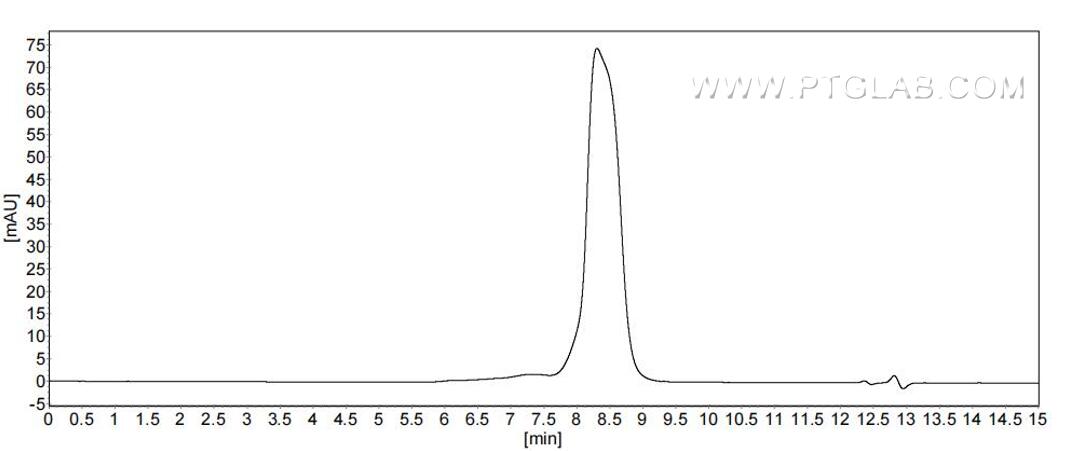Recombinant Human CD82 protein (rFc Tag) (HPLC verified)
Species
Human
Purity
>90 %, SDS-PAGE
>90 %, SEC-HPLC
Tag
rFc Tag
Activity
not tested
Cat no : Eg1749
Validation Data Gallery
Product Information
| Purity | >90 %, SDS-PAGE >90 %, SEC-HPLC |
| Endotoxin | <0.1 EU/μg protein, LAL method |
| Activity |
Not tested |
| Expression | HEK293-derived Human CD82 protein Gly111-Leu228 (Accession# P27701-1) with a rabbit IgG Fc tag at the C-terminus. |
| GeneID | 3732 |
| Accession | P27701-1 |
| PredictedSize | 39.8 kDa |
| SDS-PAGE | 43-65 kDa, reducing (R) conditions |
| Formulation | Lyophilized from 0.22 μm filtered solution in PBS, pH 7.4. Normally 5% trehalose and 5% mannitol are added as protectants before lyophilization. |
| Reconstitution | Briefly centrifuge the tube before opening. Reconstitute at 0.1-0.5 mg/mL in sterile water. |
| Storage Conditions |
It is recommended that the protein be aliquoted for optimal storage. Avoid repeated freeze-thaw cycles.
|
| Shipping | The product is shipped at ambient temperature. Upon receipt, store it immediately at the recommended temperature. |
Background
CD82 is a membrane glycoprotein and belongs to the tetraspanin superfamily, many of which are implicated in the regulation of cell motility, morphology, fusion, signaling, fertilization, and differentiation CD82 was originally identified as a suppressor of metastasis located on human chromosome 11p11.2 in prostate carcinoma. The majority of evidence indicates that CD82 expression is downregulated or abolished in a variety of malignant tumors. CD82 is present at high levels in human monocyte and macrophage lineages and in various epithelial cells in the prostate, lung, pancreas and many other tissues. In epithelial cells, CD82 is implicated in diverse biological processes such as cell adhesion, migration, apoptosis and morphogenesis. The tetraspanin CD82 is a potent suppressor of tumor metastasis and regulates several processes including signal transduction, cell adhesion, motility, and aggregation. CD82 is a key regulator of TLR9 trafficking and signaling. CD82 expressed by macrophages and dendritic cells associates with class II major histocompatibility complex (MHC) and other components of the antigen-processing and presentation pathway.
References:
1.Feng J, et al. (2015). Cancer Metastasis Rev. 34(4):619-33. 2.Khan NS, et al. (2019). FASEB J. 33(11):12500-12514. 3.Kropshofer H, et al. (2002). Nat Immunol. 3(1):61-8. 4.Jones EL, et al. (2016). J Immunol. 196(3):978-87.


